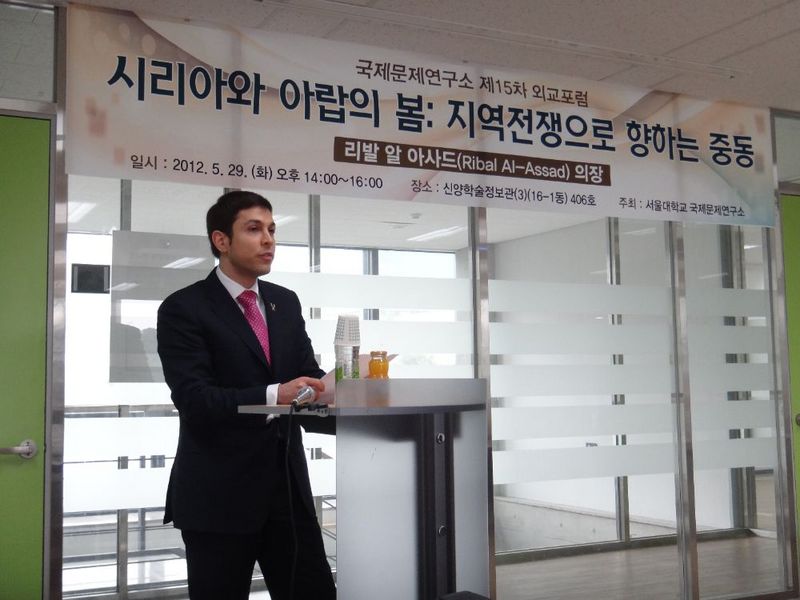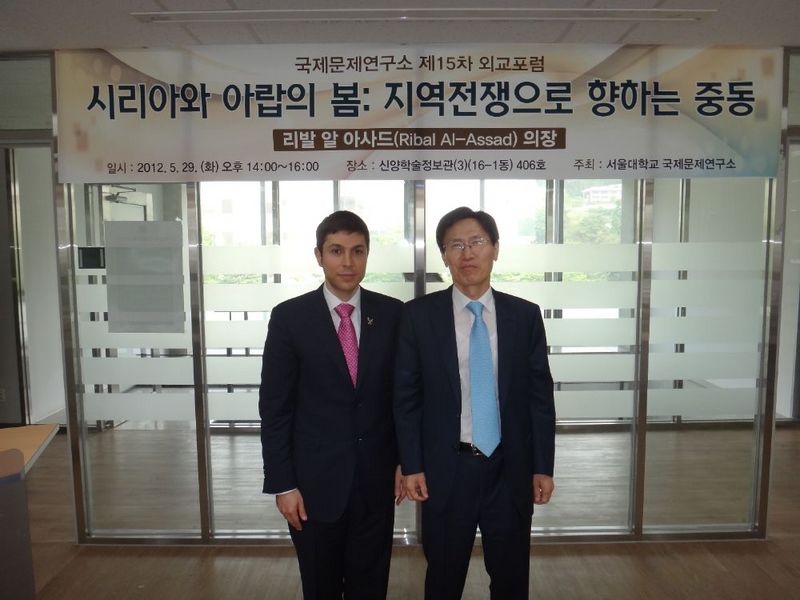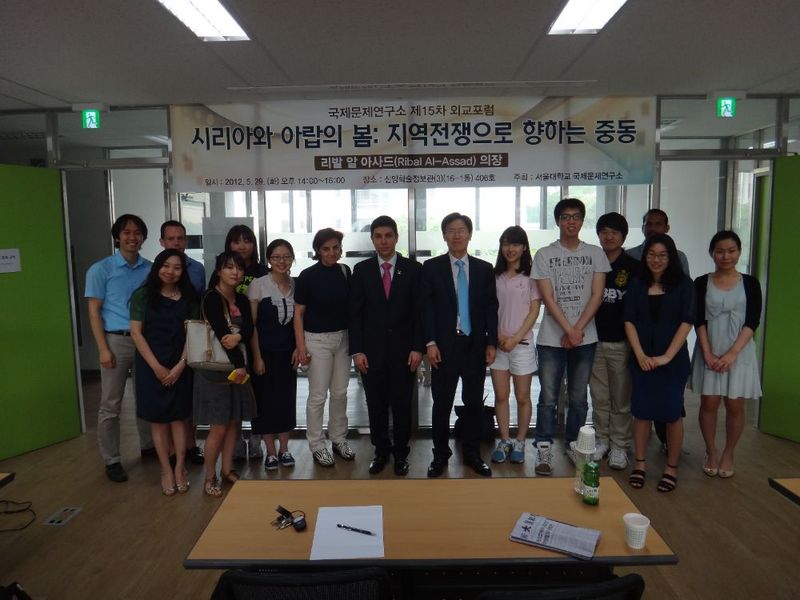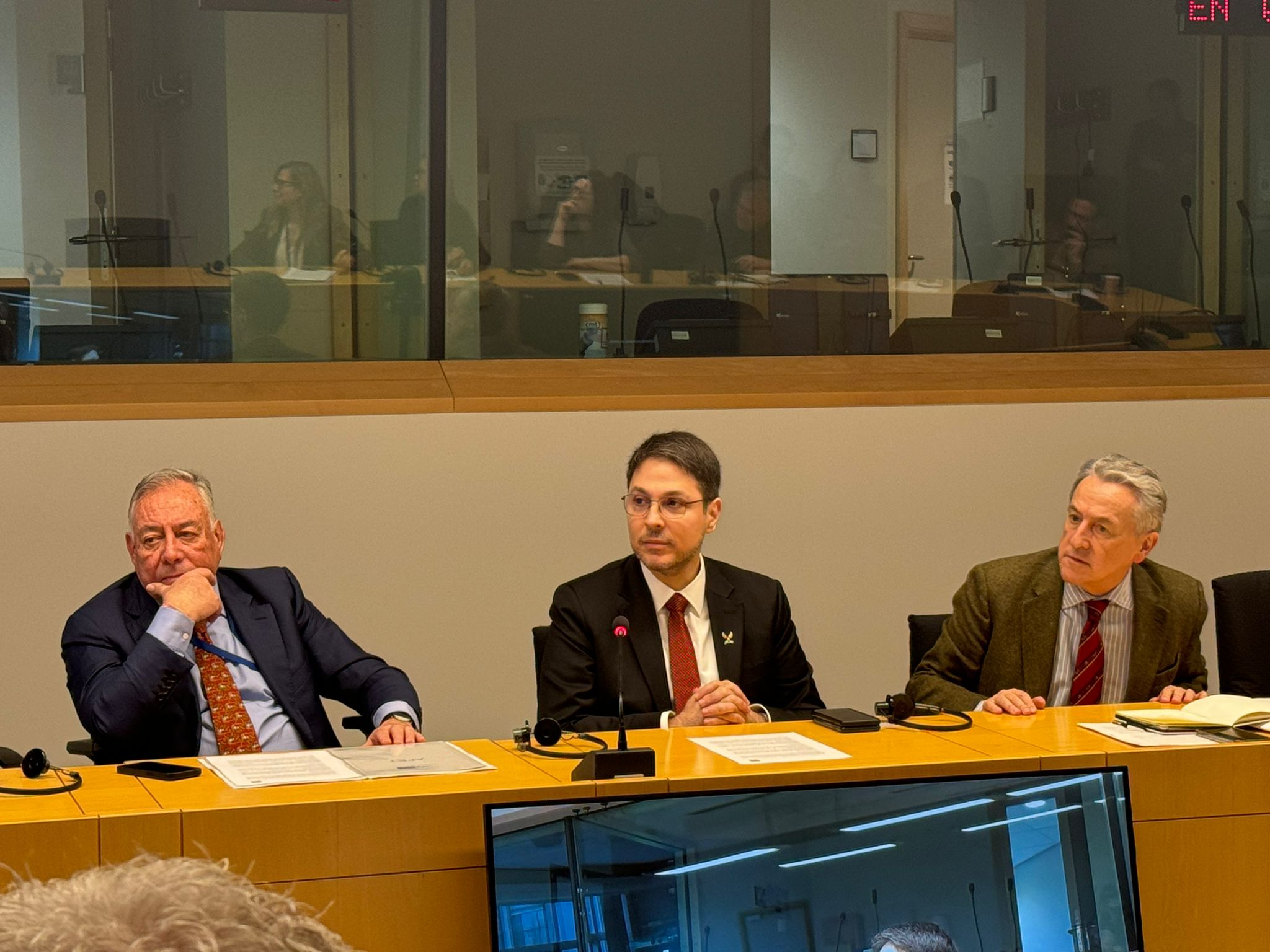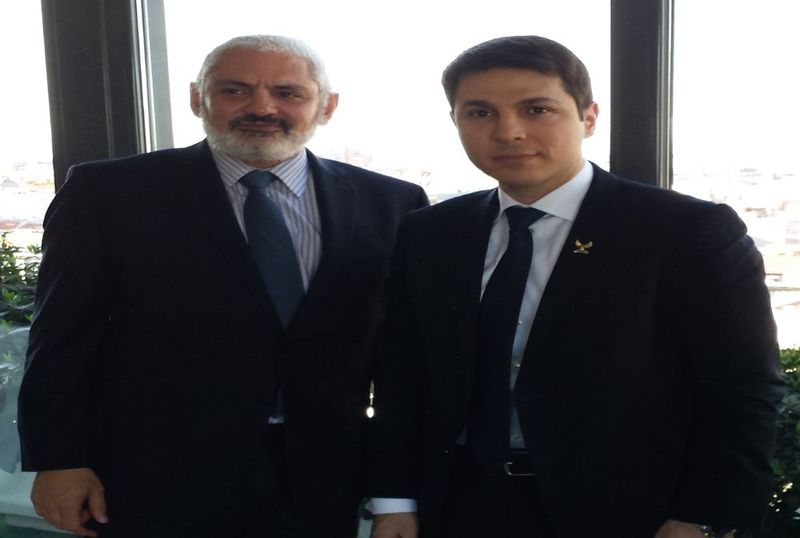Ribal Al-Assad, the Director of the ODFS, this week called for a peaceful inclusive democratic transition in Syria in a speech at Seoul National University. Ribal was hosted by Professor Yoon Young-Kwan, who is a highly distinguished professor in the University’s Department of International Relations and a former foreign minister of South Korea.
The audience included professors, lecturers and students. The speech was well received and concluded with a comprehensive Q & A Session.
Ribal Al-Assad made the following speech:
Thank you Good Afternoon.
It is a pleasure to be speaking here in South Korea at Seoul National University – a great center of learning, which is widely recognised as one of the top universities in the world.
I am humbled and honoured to be hosted by the brilliant and internationally respected Professor Yoon Young-Kwan.
Thank you for inviting me.
I condemn the violence and killings by the Syrian regime against it’s own people…
I also condemn the violence and killings carried our by some elements of the opposition
I am exiled from my native Syria …
… and I believe that the only route to a peaceful future in my country…
… is freedom and democracy.
As South Koreans, you appreciate living in a democracy more than most.
Not least because you are aware of the alternative.
In Burma, we are currently witnessing the transition from a military dictatorship to a more pluralistic society.
And my dream is that Syria will share that journey.
This was why I founded ‘the Organisation for Democracy and Freedom in Syria’ before the Arab Spring began.
And why I fear that the lack of a united opposition in Syria …
… or a true global understanding of the sinister forces influencing developments in my country …
… could destroy it.
I do not wish to begin by scaremongering.
But, as you may have read, former President Medvedev of Russia …
… spoke recently about the sort of military intervention that has been witnessed across the Middle East in recent years.
“Hasty military operations in foreign states usually bring radicals to power …” he observed …
… “At some point such actions which undermine state sovereignty may lead to a full-scale regional war, even, although I do not want to frighten anyone, with the use of nuclear weapons. Everyone should bear this in mind.” he added.
It is not often in the past fifty years that the Russian President can have been in agreement with Henry Kissinger, who has recently pointed-out …
… that the more sweeping the destruction of the existing order …
… the greater the risk of fragmentation of society …
… and the higher the risk of the disaffected seeking refuge in the arms of extremists.
This why I abhor the influx of arms and vested military interests into my country.
And why it is imperative that we seek an alternative solution.
This is not how the world’s press predicted things would turn out when …
… a year and a half ago …
… a 26 year old Tunisian graduate named Mohammed Bouazizi set himself on fire …
… sparking the first fuse of the ‘Arab Spring’.
We read of peaceful marches …
… and predictions of sweeping regime change in the manner of Eastern Europe two decades ago.
The word ‘Spring’ suggested a youthful, liberal and upbeat revolution.
In practise, and with minor exceptions …
… it has unleashed much darker forces …
… fuelled by the age-old regional cancer of sectarian hatred.
In Egypt …
… revolution was resolved internally …
… but the Muslim Brotherhood and the extremist Salafi party have sprung to the fore at the ballot box … leaving the Coptic Christian minority in terror.
Libya’s ‘Spring’ required foreign intervention …
… but here too, the outcome has been chaotic and frightening.
Militia groups rule the streets …
… last month, local leaders in Benghazi proclaimed an independent ‘State of Cyrenaica’.
In mid-April the Prime Minister was attacked in his own office.
This is not simply due to the internal cultural and political mix within each individual country.
It owes much to vested interests from abroad.
Because the key players in the region are not only anti-democratic …
… they also stand to benefit from an increase in sectarian divisions and extremism.
Much of this sentiment stems from Saudi Arabia and Qatar …
… two of the richest and most prominent players in the Arab League.
They are absolute monarchies …
… whose greatest fear is the arrival of a democratic tide across the region.
As a result, they pay lip service to democracy abroad, but act to undermine it.
Their influence in the region is increasingly aggressive.
Saudi-owned WISAL and SAFA satellite TV stations …
… have screened extremist clerics exhorting fundamentalists to, and I quote:
“Mince the minorities who are not with us and feed them to the dogs”.
They are deliberately inciting sectarian hatred.
This is not the language of a ‘Spring’.
And nor are the words of the Grand Mufti of Saudi Arabia …
… the highest authority in Islam …
… exhorting Muslims to destroy churches across the region.
And nor are the words of Sheikh Saleh al-Luhaidan, the former Chief Justice of the Supreme Judicial Council in Saudi Arabia, who has called for jihad against Alawites, even if one third of the Syrian people die.
This support for extremism is not just rhetorical.
Saudis and Qataris are investing petro dollars to accelerate the cross-border arms flow into
the unstable nations emerging from the ‘Spring’.
But why?
Context can be found in the ever-growing sectarian-fuelled enmity between Turkey and Iran.
Turkey is growing fast …
… is economically powerful …
… and is looking to develop its own power-base across the Middle East.
Iran, whose own ‘Green Revolution’ was put-down mercilessly …
… sits in an ever-growing state of isolation …
… with tentacles reaching into Syria, Iraq, Lebanon and Bahrain.
She is desperate to retain her strategic power-bases and regional leadership.
This leaves a Tehran-led Shia axis forming through Baghdad, Beirut and Damascus …
… squaring up to Turkish-led Sunni axis encompassing Riyadh, Doha and their followers.
Tensions are growing across the region …
… and Syria’s state of internal strife …
… allied to its strategic importance …
… has attracted the wrong sort of intervention from both sides.
I shall return to these sectarian alliances.
But even they do not complete the context.
Because Syria has also provided a platform for the ever growing tensions between Russia and China against the US and NATO.
NATO leaders have just openly defied Moscow by agreeing to activate a new missile defence shield in Europe in three years.
The chief of the General Staff of the Russian armed forces, General Makarov has responded by saying Moscow could carry out pre-emptive strikes on these future missile installations to protect its security.
The growing tensions over this issue are clearly part of the reason for President Putin’s non attendance at the recent G8 summit in the US.
Beijing, meanwhile, has reacted to what it perceives to be a US policy of encirclement …
… has been fighting an economic war through currency protectionism.
And as tensions escalate, both alliances display their military strength through manoeuvres and war games in Jordan and the South China Sea.
And so with the US delegating it’s regional responsibilities to Ankara …
… Iran has turned to Russia and China for support.
Extremism in Chechnya, Dagestan and parts of China gives them every reason to fear Islamism.
And so the foundations of an alliance are in place.
The recent arrival of the The Smetlivy, a Russian guided-missile destroyer, at the Syrian port of Tartus …
… did little to diffuse the rising temperature in the Eastern Mediterranean.
Nor has Moscow’s supply of three million gas marks and 72 shore to seas missiles to Syria.
Which brings me back to my country.
Where the superpowers have also been flexing their muscles diplomatically …
… as the world witnessed in the Russo-Chinese veto of the draft Security Council resolution calling on President Assad to step down.
Iran, Russia and China have subsequently hardened their support for the status quo.
The US and Turkish-led axis backs change, despite its potential consequences.
As democrats, we all abhor the Syrian regime’s barbarity.
We yearn for change.
But if recent events across Iraq, Afghanistan, Libya and Egypt have taught us anything …
… it is that enforcing change is relatively straightforward …
… but controlling its consequences is not.
War, as you will have seen in the news …
… is highly probable
Guns from both sides have already broken the UN ceasefire.
Government and opposition forces have perpetrated atrocities.
Last week’s UN report on Syria has said both sides in the Syrian conflict had committed serious human rights abuses,
…government forces have executed entire families in their homes
… and rebels have tortured and killed soldiers and government supporters.
The route from dictatorship to democracy is never easy.
But in Syria’s case …
… the journey has not even started.
The next phase is crucial.
And as Burma demonstrates …
… it requires a widely-backed, peaceful and appropriate opposition.
This is particularly true in Syria …
… 45% of whose people are represented by ‘minority’ groups, including Druzes, Kurds, Esmailis, Christians, Alawites, Shias, Jews, Turkmen, Circassians and Armenians …
… many of whom fear the incumbent regime less than its opposition.
Those people need representation.
But the Syrian National Council (the SNC) …
… is not representing them.
Nor are some of the most influential members of the Arab League …
… whose modus operandi is not just undemocratic …
… but driven by the same sectarian issues that have driven so much of the violence inside Syria and beyond.
You will all have read about the ‘Friends of Syria’ conferences in Tunis, Istanbul and Paris.
You may have assumed that they were inclusive and moderate …
… backed, as they have been, by the progressive international community …
… including Hilary Clinton who stressed the need for an inclusive, democratic, peaceful transition.
Your assumption would be understandable.
But in practise it could not be less inclusive, democratic or peaceful.
For a start, the hosts have excluded many peaceful opposition groups including our own …
… despite regular and increasingly urgent requests to attend.
In our absence, the Saudis and Qataris pooled agreement for a formalized pay structure for the Free Syrian Army (FSA) …
… and discussed official arms supplies to the armed opposition …
… just a week after the Annan plan was agreed by the International Community!
This was hardly peaceful.
In this context, it may not surprise you to hear that the SNC …
… although recognised by Secretary of State Clinton …
… has been described by Dr. Kamal al-Labwani …
… a prominent opposition leader and SNC member …
… as: “an opposition under the cloak of fanatics hiding behind a veneer of stupid liberals” …
… and, more worryingly …
… “a façade for the Muslim Brotherhood.”
He also mourned the direction of the Syrian ‘Spring’:
“away from “democracy and modernity … towards a renewed form of religious despotism.”
This is not democratic. Or peaceful.
Sadly, Dr. al-Labwanis sentiments are echoed by the Ali Sadreddine Bayanouni …
… the leader of the Syrian Muslim Brotherhood …
… who has proudly highlighted the SNC’s Islamist credentials …
… and explained how it’s leader Burhan Ghalioun was appointed, and I quote:
“We have chosen this figure that is accepted in the West and at home to prevent
the regime from capitalizing on the presence of an Islamist at the top of the Syrian
National Council.
As for this man, he is different from us with respect to political thought and ideas.”
The U.S. Director of National Intelligence James Clapper, meanwhile, …
… has described the Syrian opposition as fractured, “not a national movement” and “infiltrated by al Qaeda”.
It is not a surprise, therefore, that recent explosions in my country are covered in the fingerprints of al-Qaeda.
Your very own Ban Ki Moon, the UN Secretary General, has said he believes that the size and sophistication of some recent bomb attacks in Syria suggests that established terrorist groups may have been behind them.
This is hardly a moderate or inclusive opposition.
Its answer to the regime insisting on Baath Party membership as a precursor to sympathetic treatment and employment …
… is to propose exluding all two million members …
… an approach that is fundamentally at odds with any semblance of democracy.
It seems that nothing has been learned from the lessons of Iraq.
And so the SNC reflects the sectarian interests of the Turkish-led axis.
It is not democratic.
It is not peaceful.
It is not inclusive.
It leaves the peaceful Syrian majority unrepresented …
… and war as a preferred outcome.
All this means we are dealing with three-tiers of conflict:
The Syrian regime against its opposition …
the Iranian-led Shia axis supporting the regime …
… against the Turkish-led Sunni axis agitating for change.
With China and Russia backing the former …
… and the US and Nato supporting Turkey.
Which explains why the six member states of the Gulf Cooperation Council have approved a proposal to boost their combined military force, known as the Peninsula Shield, from 40,000 to about 100,000 before the end of the year.
Why Turkey watches its border with Syria with guns trained.
Why President Erdogan’s and Iraqi Prime Minister Maliki …
… attack each other with accusations of sectarian rhetoric.
Why Western spy satellites have picked-up Syrian chemical warheads being moved towards the Turkish border in broad daylight
Why Saudi and Qatar are arming and funding parts of the Syrian opposition.
Why the Syrian President has warned Turkey that its missiles are trained on Ankara
and Istanbul and why in a recent interview with Russian TV he issued a veiled warning to Saudi Arabia and Qatar..saying…”For the leaders of these countries, it’s becoming clear that this is not ‘spring’ but chaos. If you sow chaos in Syria you may be infected by it yourself and they understand this perfectly well.”
Why Ayatollah Ali Khamenei has said that Iran will defend Syria against any attack or adversary.
Why cleric Sheik Ahmed Abdul-Wahid and his bodyguard were murdered in northern Lebanon as the sectarian conflict develops across the Region.
Why the kidnapping of 13 Lebanese Shia pilgrims in Syria has sparked angry protests in Beirut.
Why Russia’s naval presence remains outside Tartus whilst its leaders insist that the West is still planning military action against Iran
Why a Russian ship loaded with weapons is en route to Syria and due to arrive anytime now
Why the US has increased its aid to the Syrian opposition to $25 million …
… funding arms, night-vision goggles and satellite communications.
And why the US, Russia and China look-on, happy to see their proxy battles fought away from home soil.
All of which throws into stark contrast the position of Kofi Annan and the UN.
Annan points out the requirement for peaceful dialogue on a deal for transition from within.
Like Burma.
Secretary of State Clinton and Prime Minister Cameron have both agreed.
But their support for the SNC is entirely contradictory.
Arming any opposition heightens the temperature.
Arming an opposition cited by Human Rights Watch for committing public acts of torture and abuse …
… unlocks the last barrier to war.
I began by referencing the former Russian President …
… and I will draw to a conclusion by quoting its Deputy Foreign Minister Sergei Ryabkov.
On his return home from the G8 conference at Camp David last week he said:
“Anything that will be a product of the process of national reconciliation and dialogue will satisfy the Russian side. We are nobody’s advocates in this process, If the Damascus administration is transformed without bloodshed, foreign interference, arms supplies, incitement to the use of force and so on and so forth, an alternative will satisfy us irrespective of the outcome”
Russia’s motives may be out of self interest, but these words offer a rare glimmer of hope.
Political transition avoids a power vacuum …
… and facilitates a transition to democracy.
It involves an ethical sacrifice …
… but not a human one.
This has to be the best outcome for the Syrian people.
Diplomacy may not offer Syria a great chance of a peaceful transition …
… but it is the only chance.
And it is why my ‘Organisation for Freedom and Democracy in Syria’ has published our own five point plan to maximise the chances of a peaceful future.
Firstly the opposition must act in a way that is inclusive and representative of the Syrian people by creating a platform where all parties can come together and speak with a single voice.
Secondly, it must work peacefully with the international community with the aim of non-violent regime change.
Thirdly, international funding must be channelled solely toward facilitating peace through humanitarian aid and training into the best ways to form civil groups and political parties
Fourthly, non-aligned states should be encouraged to help facilitate and encourage the journey towards political pluralism
Finally, and only once it can display real unity, can this internationally-backed, democratic opposition take on the regime by campaigning for a genuinely pluralistic election.
We have a choice to make.
Between the sectarian and the moderate.
Between haste and patience.
Between the immediate goal and the long-term strategy.
It may be too late.
But it may not.
It’s a risk worth taking.
Syria harbours a colourful mosaic of ethnicities, cultures and faiths.
It’s people provide the only opportunity to counter extremism and live in a cosmopolitan and liberal environment.
The alternative is war.
And not just a civil war …
… but a regional war in which age-old sectarian interests coincide with twenty first century global tensions.
I have feared it for many years.
I have warned against it since the start of the Arab Spring.
As Koreans,you all understand the benefits of democracy and freedom
… and the consequences of totalitarianism and dictatorship
And I urge you all to spread the word …
… on behalf of every peace-loving democrat.
شكراً لك.
